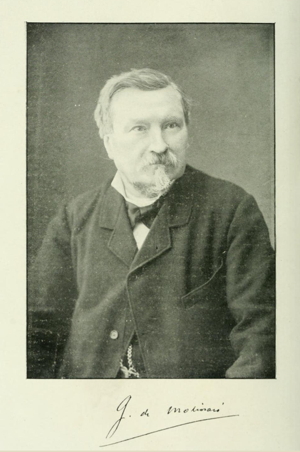3 March 2019 will be the two hundredth anniversary of the birth of Gustave de Molinari, the “founding father” of anarcho-capitalism. To celebrate this event I have put together an anthology of his key writings on the state which will be published by Institut Coppet (Paris) next year. A draft of the book is online and contains a detailed biographical essay on his life and work (in English), 24 extracts from his writings between 1846-1911 (en français) with brief introductions to each one (in English) , and an updated bibibliography of all his works (still a work in progress).
For more information about Molinari see the updated main Molinari page.
The table of contents of the the anthology:
I. Molinari’s Political Credo: “la Liberté, la Propriété, et la Paix” (Liberty, Property, Peace)
- His “Spartacus speech” (1849). [Les Soirées, 1849, S12 pp. 348–63.]
- Molinari’s Credo: “la Liberté et la Paix” (1861). [“Introduction”, Questions d’économie politique et de droit public (1861), vol. 1, pp. v-xxxi. ]
- “Programme économique” (1891). [Notions fondamentales d’Économie politique (1891), pp. 381–96.]
II. The First Formulation of the Theory of Anarcho-Capitalism (1846–1849)
- “Le droit électoral” (1846). [Courrier français, 23 July 1846; reprinted in Questions d’économie politique (1861), T. 2, pp. 271–275.]
- ”La Production de la sécurité” (1849). [JDE, T. XXII, no. 95, 15 fév., 1849, pp. 277–90.]
- “On Government and its Function” (1849). [Les Soirées, S11, pp. 303–337.]
III. Molinari’s Theory of the State I
- “Le Despotisme et les mangeurs des taxes” (1852). [Les Révolutions et le despotisme envisagés au point de vue des intérêts matériel (1852), pp. 81–152.]
- “Nations” (1853). [Dictionnaire de l’économie politique, T. 2, pp. 259–62.]
IV. The Further Development of Molinari’s Theory of Pure Anarcho-capitalism (1852–1863)
- “Les consommations publiques” (1855, 1863). [Cours d’économie politique (1855, 1863), T. 2, pp. 480–534.]
- ”De l’administration de la Justice” (1855). [L’économiste belge No. 11, 5 Juin 1855, pp. 1–3.]
V. Molinari’s Theory of the State II: The “Tempered” (strengthened, hardened) Republic (1873)
- “La République tempérée” (1873). [La République tempérée (1873), I, pp. 5–14; II pp. 15–25; V, pp. 59–77; VI. pp. 79–90.]
VI. Molinari’s Gradual Retreat from Strict Anarcho-Capitalism (1880–1908)
- ”La théorie du progrès et l’évolution économique” (1880). [L’Évolution économique du dix-neuvième siècle (1880), “Conclusion,” pp. 439–69.]
- ”Les gouvernements de l’avenir” (1884). [L’Évolution politique et la Révolution (1884), Chap. X “Les gouvernements de l’avenir,” pp. 351–423.]
- ”La liberté de gouvernement” (1887). [Les Lois naturelles de l’économie politique (1887), pp. 238–77.]
- ”Projet d’Association pour l’établissement d’une Ligue des neutres” (1887). [The Times, 28 juillet 1887. Republished in La morale économique (1888), pp. 431–38).]
- “La décadence de la guerre” (1898). [La Grandeur et decadence de la guerre (1898), selections from pp. 113–72.]
- ”La constitution libre” (1899). [Esquisse de l’organisation politique et économique de la société future (1899), pp.69–93.]
- “Le problème du gouvernement individuel” (1900). [JDE, S. 5, T. 44, N° 3, décembre 1900, pp. 321–39.]
VII. Last Words on the Matter (1901–1911)
- Summing up the liberal successes and failures of the 19th Century (January, 1901). [“Le XIXe siècle”, JDE, Jan.1901), pp. 5–19.]
- Predicting the Catastrophes of the 20th Century (January, 1902). [“Le XXe siècle,” JDE, Jan. 1902), pp. 5–14.]
- “Où est l’Utopie?” (1906). [JDE, S. 6, T. 3, N° 2, août 1904.]
- “Le vol et l’échange” (1908). [JDE, S. 6, T. 19, N° 1, juillet 1908.]
- “La crise et la décadence” (1908). [Économie de l’histoire. Théorie de l’évolution (1908), pp. 219–257.]
- Molinari’s “Last Words” (1911). [Ultima Verba: Mon dernier ouvrage (1911), “Préface,” pp. i-xvii.]

